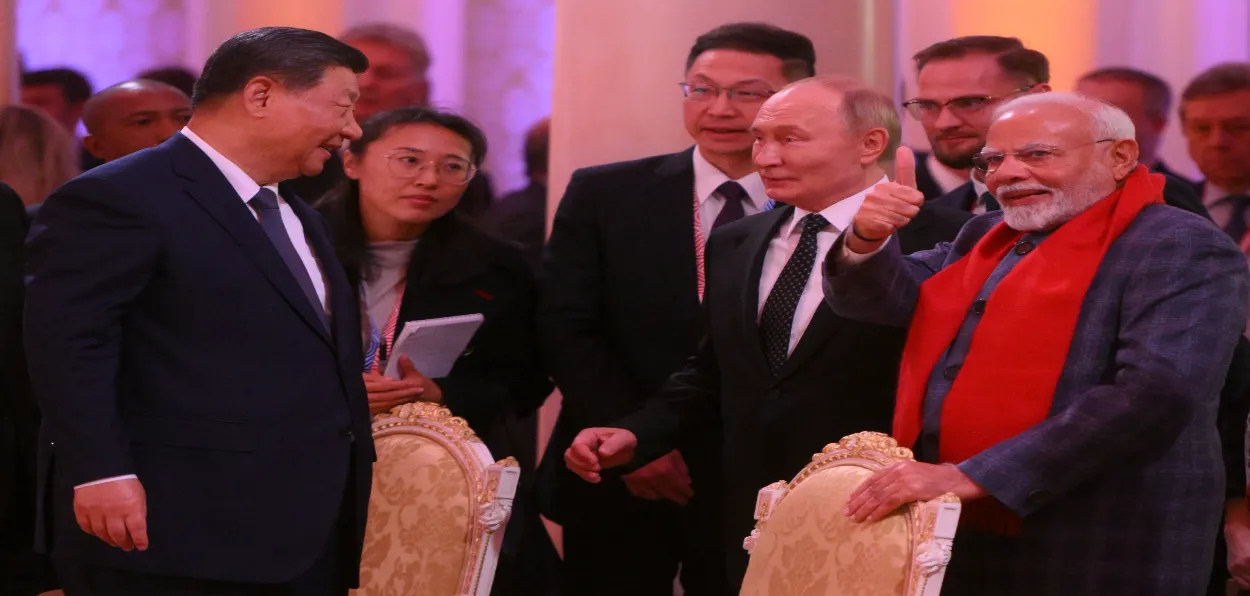
 Aditi Bhaduri
Aditi Bhaduri
The 16th BRICS summit in Kazan, Russia this year has been the most watched event in the world. Themed "Strengthening Multilateralism for Just Global Development and Security", it came against the background of Russia's intensifying war in Ukraine, and unprecedented sanctions imposed on it by the West amidst its diplomatic and political isolation. This is the largest diplomatic event hosted by Russia since its war with Ukraine began in 2022. As such, the event was supposed to prove Russia's and President Vladimir Putin's diplomatic clout.
BRICS, however, is bigger than that. Since its inception in 2006, The Western world has dismissed it as a talking shop while the BRICS continued to grow from 2009 when it comprised Brazil, Russia, India, and China and South Africa joining in 2011.
This year in Kazan the BRICS+ already included nine member states. Egypt, Ethiopia, Iran, and the United Arab Emirates joined this year and participated as full members. This was no mean feat, considering the BRICS is representative of the non-Western world.
In the words of Viktoria Panov, chairperson of the Russian BRICS Expert Committee and vice-president of the Russian Higher School of Economics, the activities of the BRICS countries are not aimed at Western countries but it's an organization of countries that makes its own decisions and plays the role of the architect in the new model of international relations.
The BRICS countries represent 45 percent of the world's population and almost 25 percent of global GDP. The International Monetary Fund (IMF) expects a bigger share of growth over the next five years to come from BRICS economies like China, India, Russia, and Brazil. Bloomberg recently reported that according to forecasts published this week based on purchasing power parity by the IMF, the expected contribution of Group of Seven members like the US, Germany, and Japan was, on the other hand, revised down. According to Bloomberg calculations using the new IMF forecasts, China will be the top contributor to global growth over the next five years, with its 22% share bigger than all G-7 countries combined, while India will be the other global growth giant.
BRICS leaders
The main takeaway from the Kazan summit was the member states pledging to strengthen multilateralism and global governance. " We reaffirm our commitment to the BRICS spirit of mutual respect and understanding, sovereign equality, solidarity, democracy, openness, inclusiveness, collaboration, and consensus," the leaders stated.
"As we build upon 16 years of BRICS Summits, we further commit ourselves to strengthening cooperation in the expanded BRICS under the three pillars of political and security, economic and financial, cultural and people-to-people cooperation, and to enhancing our strategic partnership for the benefit of our people through the promotion of peace, a more representative, fairer international order, a reinvigorated and reformed multilateral system, sustainable development and inclusive growth."
While pressing geopolitical and economic issues were discussed, including the Ukraine and the Middle East conflicts, a major takeaway was the commitment to "reform the current international financial architecture to meet the global financial challenges." While the BR8CS agreed to strengthen the IMF, a key takeaway was strengthening trade and payments amongst the members in local currencies, and pledging to find a quicker and easier cross-border payment system.
Russia has long been pushing for de-dollarization. Cut off from the international SWIFT payment mechanism, with billions of its foreign reserves in Western financial institutions frozen, Russia has turned to local currencies for its foreign trade. With China, for instance, at least 70 percent of its trade is conducted in yuan. With India too Russia has been accepting rupee payments for its energy and other exports. India too has signed up to trade in the Indian rupee with countries like the UAE, and Oman; its UPI payments system as well as the Rupay cards also functional in many countries.
Most countries are wary of unilateral sanctions, which the Kazan Declaration also made a note of, and want to hedge themselves against any similar fallout in the future. This is what has pushed some major countries like the UAE, a close US ally, and Egypt, as well as Iran, another sanctioned country, to join the BRICS grouping.
Prime Minister Narendra Modi and President Vladimit Putin at Kazan
While complete de-dollarization is not possible currently with a single BRICS currency, neither do countries like India desire it, at Kazan, BRICS countries also pledged to integrate their economies by finding an easier cross-border payment system, establishing a BRICS grains depository, and conducting feasibility studies for a BRICS Cross-Border Payment System and BRICS (Re)Insurance Company. Russia is also in talks with other BRICS members about creating an international precious metals exchange to ensure fair pricing and trade growth.
At least 30 more countries wish to join It, including NATO member Turkey. There is a hold on membership now, and another significant achievement at the Kazan summit was the induction of BRICS "partner members". Thirteen countries were added as BRICS partner countries this year: Algeria, Belarus, Bolivia, Cuba, Indonesia, Kazakhstan, Malaysia, Nigeria, Turkey, Thailand, Uganda, Uzbekistan, and Vietnam.
All these countries, as emerging economies, want to tap into the huge trade and investment opportunities that BRICS provides, including the investment opportunities from the BRICS New Development Bank, which provides an alternative to the World Bank by financing sustainable development projects in countries of the Global South. Many of these countries are also energy powerhouses like Russia, the UAE, Iran, Algeria, and Kazakhstan. Therefore, the BRICS can become a powerful energy block. The BRICS countries also hold 20 percent of the world's gold reserves with Russia and China leading the pack.
ALSO READ: Jaishankar 's participation in Islamabad SCO summit went beyond symbolism
The expansion of the BRICS cannot be ignored. While the summit itself was, undoubtedly a diplomatic win for Russia, it was also a win for the non-Western world. With the United Nations becoming increasingly weaker, and other global institutions remaining dominated by the West, much of the developing world finds in BRICS a platform where their voices may be heard and they are willing to give it a try.
India has done well to stay put, in spite of its apprehensions in the beginning. The BRICS is here to stay, at least for the foreseeable future.
